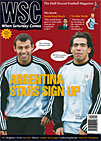 The fizz went out of football for a lot of fans in Salzburg, thanks to an energy-drink billionaire. In this update, Paul Joyce reports on the lower-league alternative to a team drained of its colour
The fizz went out of football for a lot of fans in Salzburg, thanks to an energy-drink billionaire. In this update, Paul Joyce reports on the lower-league alternative to a team drained of its colour
The acquisition of SV Austria Salzburg by Red Bull owner Dietrich Mateschitz in April 2005 reduced the 1994 UEFA Cup finalists to a mere marketing trinket. “There is no tradition, no history, no archive,” stated officials of the renamed “Red Bull Salzburg”, who initially claimed that the three-time national champions had been founded in 2005. The violet-and-white colours in which the team had played since 1933 were jettisoned in favour of the red and blue of the energy drink’s tin cans. “I can’t play with a purple bull if the brand is called Red Bull,” Mateschitz stated bluntly.
Red Bull dismissed the pro-violet campaign group Initiative Violett-Weiss as “hooligans” and “complete idiots”, and patronised them with violet-lensed cardboard spectacles. The club’s peace offer amounted to little more than allowing Salzburg’s goalkeeper to wear violet studs. So on September 18, 2005, 1,500 violet-white fans marched out of the home game against Austria Vienna en masse, never to return.
Mateschitz is still on the march, purchasing the NY/NJ MetroStars for more than $100 million and rebranding them with his trademark sensitivity as Red Bull New York. After Salzburg finished second in the 2005-06 Bundesliga season, trainer Kurt Jara was replaced by Giovanni Trapattoni and Lothar Matthäus and the club’s budget was raised to €40m. The arrival of expensive imports such as Niko Kovac and Johan Vonlanthen meant that the team that beat FC Zürich 2‑0 in a home Champions League qualifier in August didn’t contain a single Austrian. A 3-1 aggregate defeat to Valencia in the next round, however, meant that Mateschitz’s promise of regular Champions League football for his corporate toy was postponed for another year.
Blackburn fans who travel to this month’s UEFA Cup tie can expect to find a commercialised matchday experience that resembles an aggressive timeshare pitch held in a circus tent. Against the backdrop of the energy drink’s omnipresent logo and name (Bullen-Arena, Bulls’ Corner, Bullshop – you shudder to think how they’d rebrand the toilets), the Zürich qualifier seemed a mere footnote to the pre-match parade of trapeze artists, BMX cyclists, disco lights and obligatory ball-carrying parachutist. And with the vocal violet-white fans now long gone, the muted support of the new Red Bull event consumers made the racist grunting aimed at Zürich’s Guinean striker Alhassane Keita all the more audible.
For their part, the violet traditionalists reacted to the schism with Red Bull by forming a co-operation in April 2006 with ailing fourth division side PSV/Schwarz-Weiss Salzburg. Having swelled attendances throughout the region, 1,600 jubilant fans saw Gerald Berger’s goal five minutes from the end of the season save PSV from relegation in June. Power struggles in the PSV hierarchy, however, led to president Ernst Strasser excluding the entire football section from the club’s AGM.
So pro-violet supporters chose to follow the example of AFC Wimbledon and FC United and set up their own club, under the motto “A different kind of football is possible”. On July 29, the new SV Austria Salzburg (www.sv-austria.at) started life on the seventh and bottom rung of the league pyramid in 2. Klasse Nord, with a 6-0 victory over Lieferinger SV. All responsibilities in the club, from the boardroom to the turnstiles, are shared by the fans. With 700 members and attendances already averaging 900, SV Austria’s chief executive Moritz Grobovschek sees second-division football as a valid long-term goal. Any future commercial sponsorship, however, should leave the club’s name and colours untouched: “It must be possible to combine the factors of a successful business with the values of a traditional football club,” Grobovschek says.
In the meantime, supporters such as Matthias Lassnig are enjoying lower-league terrace culture: “Fans are much closer to the action, often only a metre away, without any fences.” Michael Schnelle adds: “At away games, people congratulate us on our club and are pleased that something is happening in the lower divisions.”
Whereas both fans would look forward to meeting Red Bull Salzburg in a cup match, Grobovschek is more restrained: “My anger towards them has been replaced almost by indifference,” he says. “Mind you, I still laughed when they failed to qualify for the Champions League.”
From WSC 236 October 2006. What was happening this month